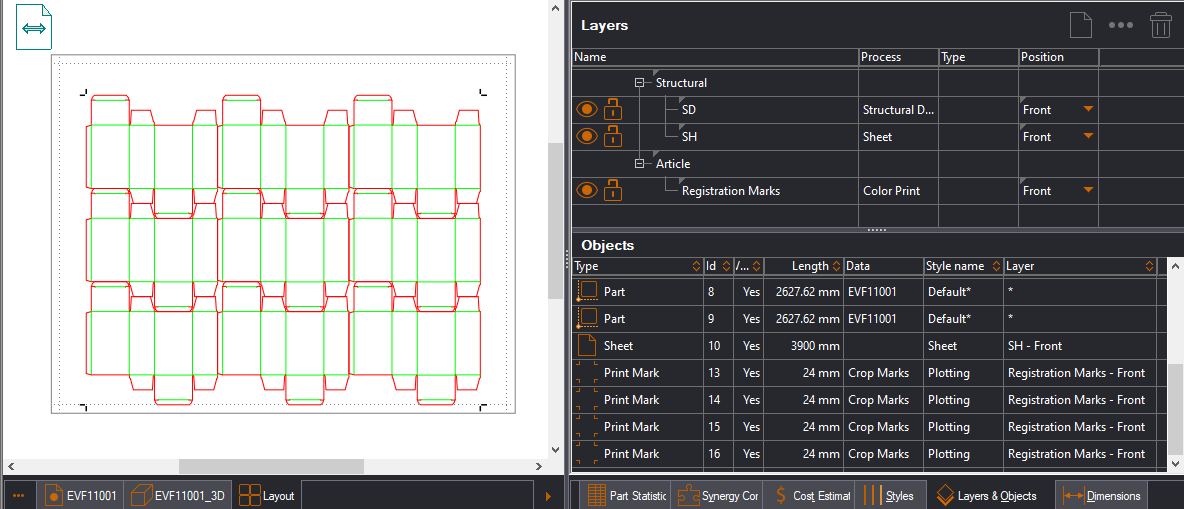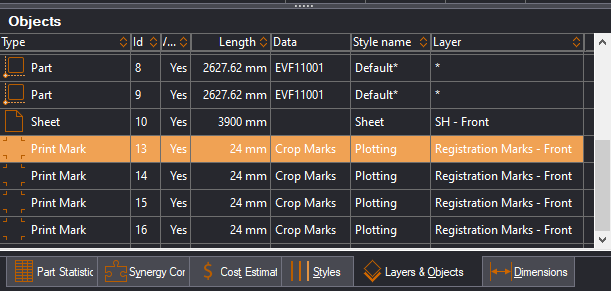Applying print mark standards
When you apply a print mark standard onto a 1up drawing or layout, you position the print marks along a bounding rectangle — that of the cutting box, of the sheet or of the dieboard. You position one print mark at a time, which snaps to the point it is meant to snap to when it was created. For example, the center-bottom mark snaps to a bounding rectangle's midpoint along the bottom side, the left-top mark snaps to the rectangle's upper left corner, and so on.
NOTE: A standard can have as many as nine print marks, but when using a particular standard you can position only the print marks that have been set in it.
An EngView installation comes with six pre-defined print mark standards:
- Center Marks, which places four print marks, in the midpoints on the four sides of the drawing's bounding rectangle (cutting box).
- Crop Marks, which places four print marks, at the corners of the cutting box.
- Japanese Marks, which places nine print marks along the cutting box: four at the corners; four at the midpoints; and at the point of intersections of the cutting box's diagonals.
- Sheet Gripper Marks, consisting of two print marks for the gripper in the lower part of the placed sheet.
- Sheet Margins Center Marks, consisting of eight print marks positioned along the corners and centers of the sides of the placed sheet, accounting for the margins.
- Sheet Margins Corner Marks, consisting of four print marks positioned at the corners of the placed sheet, accounting for the margins.
Applying a standard Removing a standard
Applying print mark standards
You can apply print marks on 1up and layout drawings.
To apply a print mark standard
- On the Layout toolbar, click Apply Standard Print Mark
 .
.
A contextual edit bar appears above the graphical area.
- In the contextual edit bar, in Standard, select the standard that you want to apply to the drawing.
- Using the mouse, start going around the drawing. As you move the mouse pointer around, you see blue-colored print marks appear at the positions set in the standard.
- To fix a print mark, click.
- Repeat Steps 3 and 4 for all the print marks that you want to place.

NOTES:
- In the tabular area, the print marks appear as an object Print Mark.
- The procedure ends with the assigning of the print marks to their own layer, which is covered in steps 6 and 7. If the marks were assigned to a layer when they were created, save the file, and skip Steps 6 and 7.
- In the tabular area, create a layer to which you will assign the print marks.
- Select the print marks, and then assign them to the newly created layer.
NOTE: Although the assignment of print marks to their own layer is not obligatory, it is highly useful. Assigning the print marks to their own layer is a practice that comes in handy in pre-production-related tasks. For example, when working with the integration with Illustrator, you may need to hide the print marks to prevent them from appearing on the final product. When they are assigned to their own layer, switching them off is easy in Illustrator's Layers panel.
Removing standards
In the graphical area
- Select any print mark.
- Do any of the following:
- Press CTRL+DEL.
- Right-click the print mark, and then click Delete.
In the tabular area
In the tabular area, print mark standards appear as a single object — Print Mark.
- In the Layers & Objects tab, select the print mark object row.

This selects the print mark object in the graphical area.
- Do any of the following:
- Press DELETE.
- Right-click, and then click Delete on the context menu.
 .
. .
.
